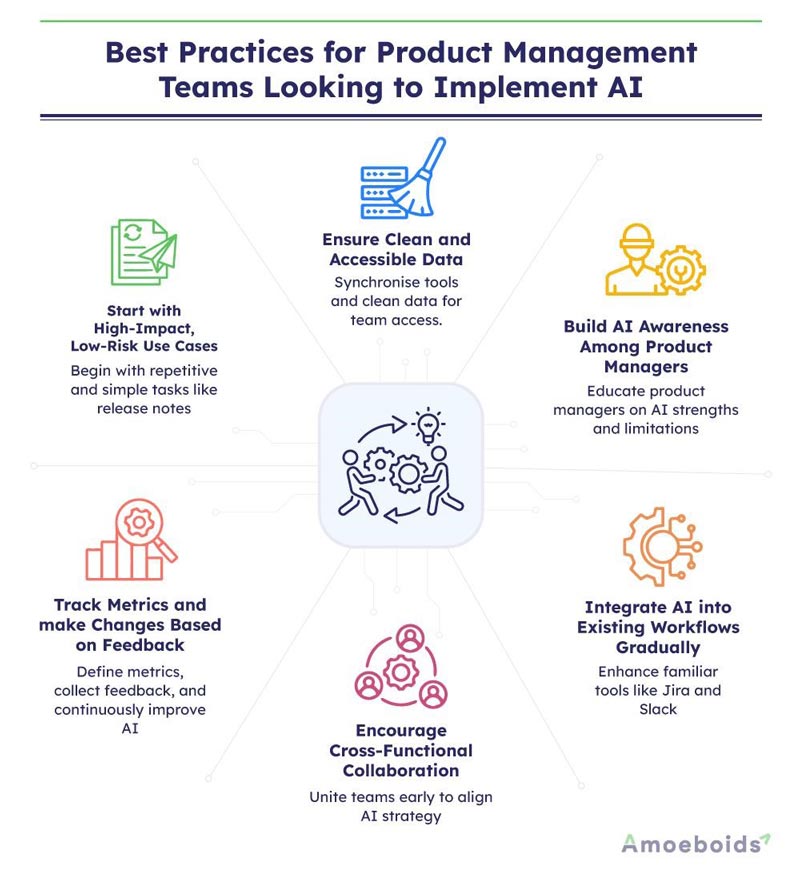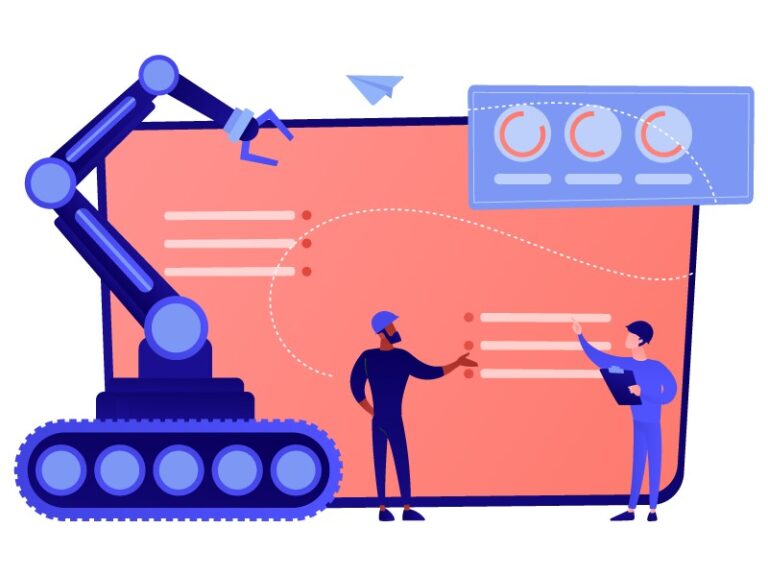AI is not just on its way, it has already arrived for product management teams!
AI was once viewed as a futuristic add-on, but it is now finding its way into the daily workflows of product management.
As you see, AI is not a replacement for product managers. Rather, it increases their impact, from automatically collecting user feedback to developing creative release notes. However, despite the enormous potential, embracing it can be difficult.
So, how can product management teams implement AI without causing chaos or cultural resentment?
To learn more, let’s look at the main challenges and best practices for helping teams in transitioning AI from a search term to a useful tool.
Understanding AI in Product Management
Using AI in product management is about seeing how it can enhance product development, customer experience, and strategic thinking. Product Management teams must grasp the pros and cons of AI to protect data, level it up, and enhance automation, statistics, and customised services.
Successful execution involves cross-functional collaboration and frequent learning. With the right method, AI can help product management teams create products that are flexible, responsive, and focused on customers.
What Makes AI difficult to Implement in Product Management Teams?
Product management teams face challenges when integrating AI. It happens due to a shortage of trained AI expertise and outdated data quality. Aligning cross-functional teams, dealing with ethical issues, and blending AI into existing and common workflows all complicate the situation.
Meanwhile, unattainable goals and resistance to change can stall the progress. Strategic planning and guidance will be required in such cases to ensure successful implementation.
Let us divide the major AI implementation challenges for product teams.
5 Key Challenges of Implementing AI in Product Management Teams
AI integration in product management is a cultural and operational change and not merely a technical advance. Teams must carefully deal with the many implementation barriers, despite the allure of automation and more useful information.
- Poor Data Quality and Limited Access: AI systems need data that is organised, controlled, and clean. The future potential of AI is, however, limited because product data is usually saved in spreadsheets, analytics platforms, and support tools.
- Lack of AI Knowledge Among Product Managers: Product managers aren’t just data scientists. PM teams who do not understand core analytics concepts may ignore or dismiss data-based insights.
- Integration with Existing Tools and Workflows: Product managers will face problems if AI doesn’t integrate with the platforms they already use, such as Jira, Notion, or Slack.
- Team Resistance and Change Management: Change comes with AI. Change is frequently avoided due to anxiety about being fired, misunderstandings, or a lack of training.
- Ethical and Compliance Issues: AI can create ethical risks that product teams must actively manage, like biased AI algorithms and unclear reasoning when making choices.
A people-first method, knowledge, and strategy are required for the successful implementation of AI in product management.
Best Practices for Product Management Teams Looking to Implement AI
To integrate AI into product management, strategy, alignment, and constant iteration are required in addition to enthusiastic support. These best practices will assist teams in deploying AI in ways that benefit people, make a difference, and endure.

Start with High-Impact, Low-Risk Use Cases
Don’t attempt to change everything at once. Start with easy and repetitive tasks like creating release notes or summarising feedback. It will help you to establish early trust and highlight speedy milestones.
Ensure Clean and Accessible Data
The quality of AI depends on the data it interprets. Make sure your tools are synchronised, your data is clean, and teams have quick access to the information they require.
Build AI Awareness Among Product Managers
Make it clear for product managers what AI can and cannot do. Provide training or short workshops to boost confidence and clarify technical terms.
Integrate AI into Existing Workflows Gradually
Avoid making changes. Rather, enhance the existing tools by implementing AI that your team already uses, such as Jira, Notion, and Slack. Smooth integration leads to increased commitment and consistency in usage.
Encourage Cross-Functional Collaboration
Bring together the analytics, engineering, and design teams right away. Their advice makes sure AI supports more general product goals.
Track Metrics and make Changes Based on Feedback
Establish precise success metrics in advance. Measure performance, collect customer feedback, and iteratively improve your AI launch strategy.
Examples of AI Use Cases in Product Management Teams
AI is no longer a trendy idea. It’s already built into the tools that product teams use on a daily basis. These real-world AI examples improve workflows and decisions without compromising existing product team operations.
- Airtable’s Smart Feature Suggestions: Airtable implements AI to understand how users interact with their bases and makes customised suggestions to boost workflows. It provides product teams with faster, smarter workflows via automation suggestions and customised views.
- Notion’s AI-Generated Summaries: Notion uses AI to create instant summaries of lengthy documents, meeting notes, and product specifications. Product managers can easily share brief updates with stakeholders, stay focused, and lessen information overload due to this.
- Amoeboids’ AI-Powered Automated Release Notes and Reports App for Jira: The AI-powered Automated Release Notes and Reports app creates professional and consistent release notes and reports from Jira issues automatically. It saves hours of manual work, ensures accuracy, and helps cross-functional teams stay on track. Also, it makes it a very useful tool for agile product teams that release often.
These real-world examples demonstrate how AI applications can produce significant results.
Conclusion
Success with AI usually starts with the correct method and not the correct tool.
AI in product management calls for constant learning, research, and collaboration. Small and targeted steps like integrating AI, combining data, and increasing AI communication across teams lead to success.
So, would you like to see real-world AI in action?
Start by using the AI powered- Automated Release Notes and Reports app for Jira to automate your release notes and stakeholder reports!
A simple and effective remedy to AI that saves time, improves clarity, and supports collaboration.

0 Comments